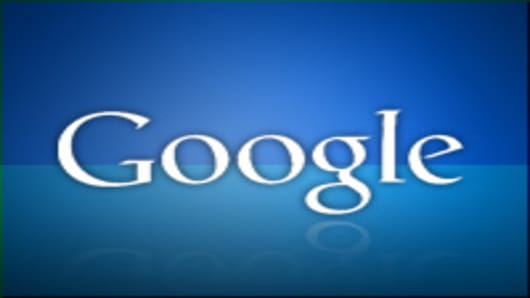Call it theGoogleParadox: Shares severely depressed these last few months, touching $538 last week, and yet the prevailing feeling on Wall Street--by far--is that Google is still the best deal going for net-sector investors.
I blogged about this last week when Google shares were plunging, and as I was furiously typing, shares kept plunging, down over $60 each at one point. Made no sense to me then; makes no sense to me now a day ahead of the company's earnings report. Let's be real here, too, for a second: Google went from $500 to $747 last year, hardly a non-performer. The paradox comes from the slide beginning Jan. 1 that took Google shares from $700 down to today's $545. What took a year is gone in three weeks, despite what still seem to be strong fundamentals? Looks way overdone to me.
I mean, I get the whole "law of large numbers" idea of slowing growth at Google; that it's still largely a one-trick pony generating virtually all of its staggering revenue from a single revenue source: Search advertising. That the wireless spread spectrum auction Google's playing in could end up becoming a multi-billion dollar albatross around the company's neck; and that Microsoft seems to be gaining ground in Search based on its earnings report last week.
But then the realist in me sets in and I see Google's share price and the vast opportunities that lay ahead. Google trades at 26 times next year's earnings. Way below Yahoo's , which proved yesterday that any competitive concerns Google may have had about Yahoo are likely overblown, and that any meaningful turnaround at Yahoo is still at least a year away, based on the company's own comments during last evening's conference call. And yet Yahoo is a far more expensive proposition than Google. Same with Amazon, which boasts an even bigger multiple than Yahoo's, yet is nowhere near as profitable as Google.
Nope, the Google Paradox is perplexing. Search continues to go well; and the company will move significantly into display advertising with the DoubleClick deal which should provide significant new revenue streams. Detractors say with a recession looming, the DoubleClick deal becomes less important because advertising is the first thing companies cut back on. But Google's different in that its free to consumers, and advertisers only pay for their ads if those ads yield any kind of sales leads. The performance-based model could be even more valuable to Google clients as they become more desperate for sales leads during an economic slowdown.
The company released "Open Social" as it makes its way into the social networking realm, signing News Corp.'s MySpace as one of its partners during the quarter. The cell phone initiative Android was also released, and could be a key piece of the puzzle if Google wins the spread spectrum auction, which might be pricey, but Google can easily afford it. It can easily afford to build out a network with partners, and the payoff potential could be massive. If it loses the auction, it doesn't have to write the big check in the first place. To me, it's a win-win.
Consensus on the Street is $4.44 for fourth quarter EPS on $3.45 billion (excluding traffic acquisition costs) in revenue. The numbers seem do-able. I wouldn't look for a massive "beat," just something in-line with the usual saw of a strong quarter with "trends looking solid," or whatever the typical language usually is.
That may be Google's biggest problem: in this case, predictability, which is something that hasn't been a factor before. Not a lot of reason to be excited. And that might just be the point: We'll watch the margins, we'll watch the hiring line, we'll watch to see that Google's got costs under control and that its outlook, such that it is, doesn't include some negative commentary no one is expecting. If Google is predictable, does well, and speaks confidently, those alone may serve as the catalysts to get these dampened shares back on the high ground once again.
Questions? Comments? TechCheck@cnbc.com


